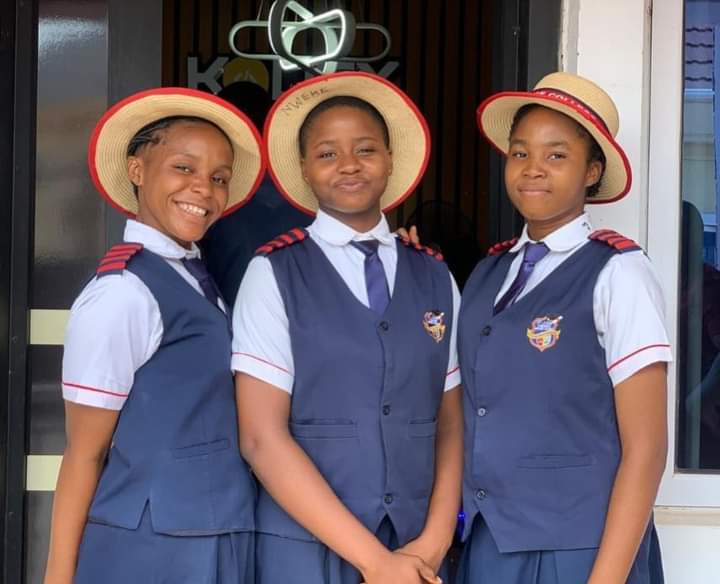Tech
A Rise in Cyberattacks Such as Ransomware During COVID-19 Boosted Security Skills in 87% of IT Teams in Nigeria, Sophos


Sophos, a global leader in next-generation cybersecurity, today announced the findings of its global survey, “The IT Security Team: 2021 and Beyond,” which shows how increased security challenges during the pandemic offered IT teams a unique opportunity to build their cybersecurity expertise.
The vast majority of IT teams in Nigeria that faced a rise in cyberattacks (87%) and a heavier security workload (91%) over the course of 2020 strengthened their security skills and knowledge.Despite the challenges created by the pandemic, 52% of the IT teams surveyed globally, said team morale increased during 2020.
The increase in cyberattacks during the pandemic impacted IT security skills across all industry sectors covered in the survey, including, at a global level, education (83%), retail (85%) and healthcare (80%). The survey polled 5,400 IT decision makers in mid-sized organizations in 30 countries across Europe, the Americas, Asia-Pacific and Central Asia, the Middle East, and Africa.
“Around the world, 2020 was an unprecedented year for IT teams,” said Chester Wisniewski, principal research scientist, Sophos. “IT professionals played a vital role in helping organizations to keep going despite the restrictions and limitations necessitated by COVID-19. Among other things, they enabled education institutions to move learning online, retailers to switch to online transactions, healthcare organizations to deliver digital services and care under incredibly tough circumstances, and ensured public entities could continue to provide essential services.
“Much of this will have been done at high speed, with limited equipment and resources available and while facing a rising tide of cyberattacks against the network, endpoints and employees. To say things were probably pretty stressful for most IT teams is an understatement.
“However, the survey shows that in many cases these challenges have created not just more highly skilled, but more motivated IT teams, ready to embrace an ambitious future. As a growing number of countries are able to start planning for life beyond pandemic restrictions, we have an excellent opportunity to implement new IT and security policies, adopt more secure modern tools to manage employees and operations beyond the IT perimeter, build expert teams that blend in-house and out-sourced talent, and introduce security platforms that combine intelligent automation with human threat hunting expertise. There is no going back. The future may be just as unprecedented as the past.”
The main findings of “The IT Security Team: 2021 and Beyond” global survey for Nigeria include:
· Demands on IT teams increased as technology became the key enabler for dispersed and digital organizations. Overall IT workload (excluding security) increased for 66% of IT teams,while 69% experienced an increase in cybersecurity workload
· Adversaries were quick to take advantage of the opportunities presented by the pandemic: 60% of IT teams overall reported an increase in the number of cyberattacks targeting their organization over the course of 2020
· The overall experience of 2020 enabled 82% of IT teams to build their cybersecurity skills and knowledge. It is likely that much of this professional development will have been informal on-the-job learning, acquired as teams tackled new technology and security demands, often under intense pressure and remote from their normal place of work
· Facing challenges together boosted team morale. IT team morale also improved for many teams. More than half (59%) of the IT teams surveyed said team morale increased over the course of 2020. Morale is also likely influenced by external and personal circumstances during the pandemic, such as local lockdowns, the inability to see family and other factors. Regardless, the findings suggest that a shared purpose, a sense of value and facing adversity together helped to bond and lift the spirits of IT teams
· The experiences of 2020 have fuelled ambitions for bigger IT teams and using advanced tools such as artificial intelligence (AI) in future technology strategies. Many organizations appear to have entered 2021 with plans to increase the size of both in-house and outsourced IT teams, and to embrace the potential of advanced tools and technologies. The survey found that 72% of IT teams anticipate an increase in in-house IT security staff by 2023, and 51% expect the number of outsourced IT security staff to grow over the same time frame. An overwhelming majority (94%) expect AI to help deal with the growing number of attacks and 93% with the complexity of attacks. This could be due in part to the fact that 47% of IT teams believe that cyberattacks are now too advanced for the in-house team to tackle on their own
The “IT Security Team: 2021 and Beyond” survey report is available in full on Sophos.com.
The IT Security Team: 2021 and Beyond survey was conducted by Vanson Bourne, an independent specialist in market research, in January and February 2021. The survey interviewed 5,400 IT decision makers in 30 countries, in the US, Canada, Brazil, Chile, Colombia, Mexico, Austria, France, Germany, the UK, Italy, the Netherlands, Belgium, Spain, Sweden, Switzerland, Poland, the Czech Republic, Turkey, Israel, UAE, Saudi Arabia, India, Nigeria, South Africa, Australia, Japan, Singapore, Malaysia, and the Philippines. All respondents were from organizations with between 100 and 5,000 employees.
Tech
Anambra School Emerges Winner In National Girls In ICT Competition With Groundbreaking VR Technology


St. John Vianney Science College, Igbariam, used their virtual reality project to conquer the National Girls in ICT Competition 2024, claiming the national championship title yesterday!
The National Girls in ICT Competition, organized by the Federal Ministry of Communication, Innovation and Digital Economy, is a technology innovation competition for all girls in secondary schools across Nigeria.
Their innovative project, M-Tag VR, allows users to explore iconic landmarks like Zuma Rock and learn about fascinating cultural aspects of Nigerian tribes. The girls, Immaculate Ebube Ikegwuonu, Camilla Anyadike, and Nweke-Nonso Oluchi, mentored by their coach, John Onuigbo, triumphed over teams from all 36 states.
The girls’ talent shone brightly throughout the competition. They started at the state level where they aced the Anambra state competition, then proceeded to conquer the Southeastern regional championship, defeating teams from Ebonyi, Imo, Abia, and Enugu, to make it to the national finals.
Rivers and Lagos states secured the second and third-place positions, respectively.
Tech
Google To Delete Billions Of Browser Records To Settle ‘Incognito’ Lawsuit


CNN reported that Google will delete billions of data records as part of a settlement for a lawsuit that accused the tech giant of improperly tracking the web-browsing habits of users who thought they were browsing the internet privately.
The suit was originally filed in 2020 and accused Google of misrepresenting the kind of data it collects from users who browsed the internet via “Incognito” private browsing mode in Chrome. Google agreed to settle the suit late last year, but the terms of the settlement were first disclosed in a filing on Monday.
As part of the settlement, Google must delete “billions of data records” that reflect the private browsing activities of users in the class action suit, according to court documents filed Monday in San Francisco federal court.
Google will also update its disclosure to inform users about what data it collects each time a user initiates a private browsing session. Google has already started implementing these changes.
For the next five years, Google will also let private browsing users block third-party cookies as part of the settlement. Google also will no longer track people’s choices to browse the internet privately.
Tech
NIN-SIM Linkage: NCC Directs Telecommunication Operators To Bar Non-Compliant Subscribers


The Nigerian Communications Commission (NCC) has confirmed that it would not be reviewing its deadline to bar owners of more than four SIM cards whose SIM registration data failed to match their National Identity Number (NIN) data.
A source within the Commission explained that the Commission’s position was hinged on its objective to clean the country’s SIM ownership database, and ensure that criminals could not take advantage of having multiple unlinked SIMs to carry out their nefarious activities.
“We are not standing back on our decision. March 29th is sacrosanct. Our resolve is hinged on the need to close in on the chaos of untoward ownership of multiple SIM cards with unverified NIN details. We have instances where a single individual has over 10,000 lines linked to his NIN. In some cases, we have seen a single person with 1,000 lines, some 3,000 plus lines. What are they doing with these lines?
“From our interim findings, the owners of these lines did not purchase them for decent purposes or to undertake legitimate activities.
“We have given them enough time to make the decision of which of their lines they want to keep, and discard the others. They did not. All lines in this category with unverified NINs will be barred. They will be then expected to go to their operators and decide which of the lines they want to keep, as well as submit correct NIN details.
“Some people would say they want to use it for car trackers, or for IoTs, but provision has been made for these services already. They are not under the ‘Max-4 Rule.’
“Across the world, no country allows you to have 1,000 SIM cards to make calls or texts.”
The Max-4 Rule announced by the Federal Government in April 2021 provides that telecom subscribers cannot have more than four lines per mobile network operator.
The NCC has also provided Mobile Network Operators (MNOs) an extension till July 31st 2024 within which they are expected to verify all NINs submitted by subscribers with four (4) or less SIMs, as well as bar those whose NIN fail verification with NIMC.
An authoritative source within the Commission who is familiar with the matter stated that the Commission’s management arrived at the decision at a crucial meeting it held today to review requests from the major Mobile Network Operators requesting for extension for the verification of NINs submitted.
The source also stated that the Commission is mulling the idea to approve an online application solution for MNOs where their subscribers whose NIN verification failed due to biometric mismatch can update their records on the app, while existing subscribers can register additional lines.
-



 News2 days ago
News2 days ago“80% Of Buildings In Lekki Have No Approval” – Lagos State Commissioner For Physical Planning & Urban Development Reveals
-



 Education5 days ago
Education5 days agoFederal Government Sets To Commence School-To-Work Scheme
-



 News4 days ago
News4 days agoLady Dies After Friends Pushed Her Into Boiling Pot Of Fresh Pepper In Delta State
-



 Finance4 days ago
Finance4 days agoEFCC Chairman Tasks Nigerian Youths Against Crimes And Fraudulent Acts
-



 Entertainment2 days ago
Entertainment2 days agoCelebrities Turn Up For The Dedication Of Ali Baba’s Triplets In Lagos
-



 Finance22 hours ago
Finance22 hours agoBanks To Now Charge 0.5% Cybersecurity Levy As Directed By CBN; Netizens React
-



 TechNews2 days ago
TechNews2 days agoSIM Boxing, And The Unboxing of a Crime Syndicate
-



 GRTech24 hours ago
GRTech24 hours agoSHELT SI Achieves Cisco Select Partner Certification







